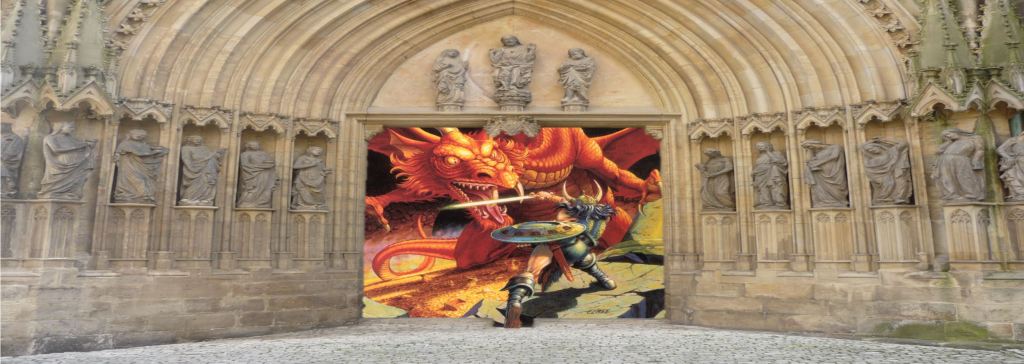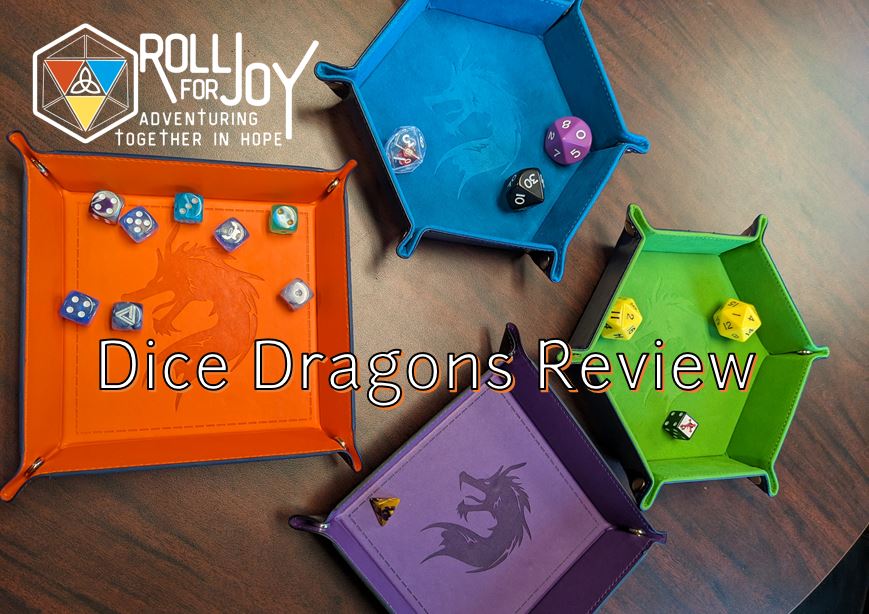Jack Chick famously threw down the gauntlet in the fight between “Christianity” and Dungeons & Dragons with his cartoon tract Dark Dungeons.♣ Ever since, there has been a sometimes perceived and sometimes real cultural battle between people of faith and people of fantasy. Although in today’s world arguments like Chick’s are more lambasted than listened to, they still exist and still raise their ugly heads in far too many places. Even just yesterday, as I was sitting in the hospital lobby waiting to visit a parishioner, I found a stack of “Christian” pamphlets, including one that warned of the dangers of “Entertainment, Amusements, & Fun”.
The driving purpose of this entire blog is to provide a sound Christian witness for why such positions are spiritually weak and theologically bankrupt. It almost seems silly for me to write about something that seems so obvious. Why waste my time on debating such small and little listened to positions? But then I remember that stack of “Christian” pamphlets and I hear the voices of those who experience this conflict between faith and fantasy first-hand, perhaps through a religious leader or a parent, and I know that there needs to also be a voice of faith and reason to respond.
So, can a devout Christian play Dungeons & Dragons? What if that person is a pastor? The answer is OF COURSE! Dungeons & Dragons is a game after all, not a portal to the abyss nor a secret cult of devil-worship! But let’s break that obvious (at least to me) answer down, shall we?
Playing D&D as a pastor presents three different questions. First there is the question of whether, according to my Christian faith, it would be ontologically harmful for me to play D&D, or engage in fantasy role playing of any kind. Then there is the question of my responsibility as a pastor to my church members in this situation. Finally I must ask myself how playing or not playing D&D affects the efforts of my and my church’s mission to the world. In my view, the ideal response to the supposed “D&D problem” is one which must deliteralize role playing games, maintain pastoral integrity, and show how Dungeons & Dragons not only does not diminish my participation in God’s mission to the world but even has the potential to enhance it.
This post will be the first of three posts, addressing each of these three points in turn.
So what is Dungeons & Dragons from a Christian perspective? Would playing this game be ontologically harmful to me as a Christian, as Chick and others would like to suggest? Would I be worshipping an idol or engaging in some vile form of sorcery in the process?
The Apostle Paul deals with a very similar issue in 1 Corinthians 8. Paul writes about how a faithful Christian ought to treat food that has been offered to idols. This is food that was actually offered in sacrifice to pagan gods. And what does Paul say? Paul declares that eating food offered to idols is no offense against God or the Christian tradition. He writes, “Hence, as to the eating of food offered to idols, we know that ‘no idol in the world really exists,’ and that ‘there is no God but one.’”♥ Paul maintains the uniqueness and the universality of God, and encounters no ontological conflict in eating food offered to idols.
Paul knows that ‘no idol in the world really exists’. Food offered to pagan gods is offered to nothing but a harmless fantasy. It’s just food. In the same way, engaging in fantasy role playing games like D&D is equally harmless to our spirits. Although we might speak of Bahamut, Tiamat, sorcery, and portals to the abyss, we also know that ‘no idol in the world really exists’. It’s all make believe. There isn’t an actual portal to the abyss. There are no actual devils and demons. As much as the literalists might like to claim otherwise, anybody with unclouded eyes and unclogged ears can see that it’s nothing but harmless fantasy.
The ontological harmlessness of playing D&D and other games like it is supported by Martin Luther in his treatise “The Freedom of a Christian”. He writes, “First, with respect to kingship, every Christian is by faith so exalted above all things that, by virtue of a spiritual power, [he/she] is lord of all things without exception, so that nothing can do [him/her] any harm. As a matter of fact, all things are made subject to [him/her] and are compelled to serve [him/her] in obtaining salvation.”♠ In this proclamation Luther is saying that even the simple act of playing Dungeons & Dragons is compelled to serve the Christian in obtaining salvation. If D&D is played as an act of the faith of the Christian, knowing the act to be benign, then the faith of that Christian is increased as he/she discovers that indeed no personal spiritual harm has come to him/her.
I’ll leave you with this one final caveat. Let’s say a person with a literalistic faith, say Jack Chick, plays Dungeons & Dragons without this certainty of it being spiritually benign. If such a Christian plays D&D, then that Christian has sinned. Paul writes, “But those who have doubts are condemned if they eat, because they do not act from faith; for whatever does not proceed from faith is sin.”♦ Playing D&D is a work, it’s something we do. If Mr. Chick trusts in the defining characteristic of his works over and against the defining power of faith, then he has sinned. Faith must be what defines the true Christian. For it is only through faith that we come to the experience of God’s abundant grace.
So have faith. Delve your dungeons and defeat your dragons. The only thing you risk in doing so is having an amazing adventure.
Next up: Can a responsible pastor enjoy the RPG pastime? Spoiler: YES!
♣ If you really want to see the ridiculousness, go to http://www.chick.com/READING/TRACTS/0046/0046_01.ASP.
♥ 1 Corinthians 8:4
♠ Martin Luther, Three Treatises, trans. Charles M. Jacobs (Philadelphia: Fortress Press, 1970), 289.
♦ Romans 14:23






Leave a comment